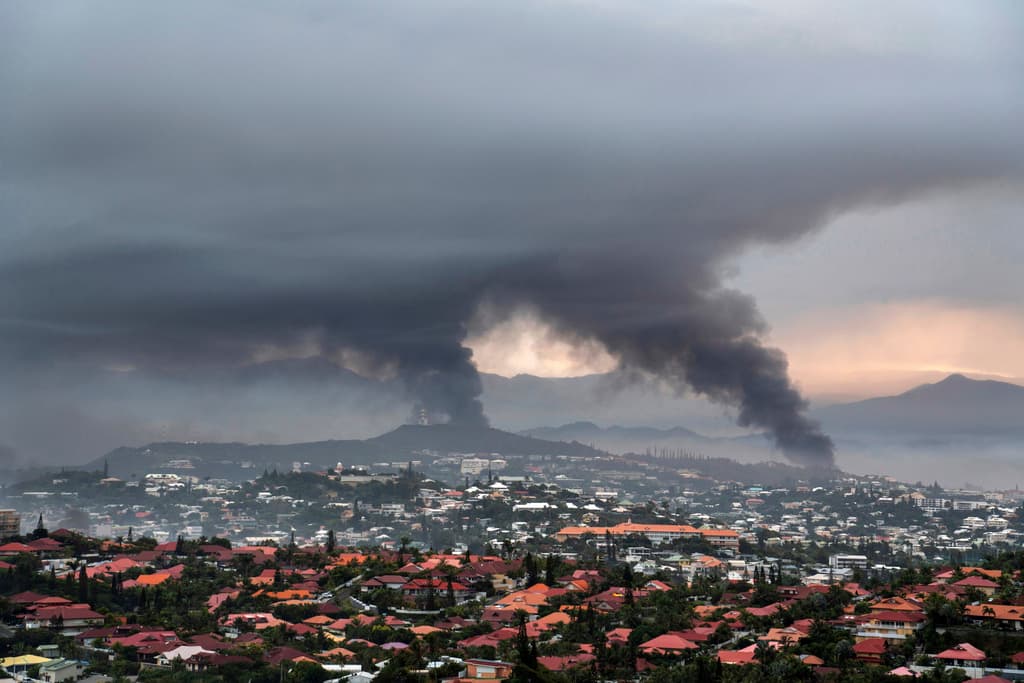Violence Engulfs a Mineral-Rich Former French Colony, New Caledonia
The last time France imposed emergency powers on one of its overseas territories was in 1985, also in the South Pacific island of New Caledonia.

While many people know about French Polynesia, few outside of France are aware of the more far-flung French territory of New Caledonia. The cigar-shaped South Pacific island has its fair share of white sand beaches and blue lagoons, as well as a quarter of the world’s reserves of nickel.
For the third consecutive day, violence raged across the French Pacific island Thursday, hours after France imposed a state of emergency — boosting security forces’ powers to quell unrest in the archipelago that has long sought independence from Paris.
French authorities in New Caledonia and the interior ministry at Paris said five people, including two police officers, were killed after protests earlier this week over voting reforms pushed by President Macron’s government turned deadly.
At least 60 members of the security forces were injured and 214 people were arrested over clashes with police, arson, and looting, the territory’s top French official, High Commissioner Louis Le Franc, said Thursday.
“Everything is being done to restore order and calm that Caledonians deserve,” the French prime minister, Gabriel Attal, said after a meeting at the Elysee presidential palace.
Mr. Attal said that in addition to 1,700 security forces troops that have already been deployed to help police, 1,000 more are on the way, but the situation “remains very tense, with looting, riots, arson and attacks, which are … unspeakable.”
Two members of the island’s Indigenous Kanak community were among the five dead, the French interior and overseas territories minister, Gerald Darmanin, said Thursday as he vowed that France “will regain total control.”
He said 10 people, all allegedly from the pro-independence movement known as the Field Acton Coordination Unit, were under house arrest. In April, the group backed several protests against French authorities on the island.
Mr. Darmanin claimed the movement is a “small group which calls itself pro-independence, but instead commits looting, murder, and violence.”
The National Council of Chiefs of the Indigenous Kanak people condemned “all acts of vandalism and gun violence,” but rejected the allegations that the pro-independence movement was involved in the deadly violence.
Grand Chief Hippolyte Sinewami-Htamumu expressed full support for the pro-independence group, which has mobilized more than 100,00 people “of all ages and from all backgrounds” in peaceful protests in recent months at the capital, Nouméa, and throughout the island.
“This is not a ‘terrorist group’ or ‘mafia group,’ as certain political leaders want us to believe,” he said in a statement on Thursday.
The state of emergency will be in place for at least 12 days as French military forces were being deployed to protect ports and airports and to free up police troops. The curfew has been extended until Friday morning, the high commissioner, Mr. Le Franc, said.
The last time France imposed emergency powers on one of its overseas territories was in 1985, also in New Caledonia.
The Pacific island east of Australia, home to about 270,000 people and 10 time zones ahead of Paris, is known to tourists for its Unesco World Heritage atolls and reefs. Yet tensions have simmered for decades between the Indigenous Kanaks seeking independence and the colonizers’ descendants who want it to remain part of France.
People of European descent in New Caledonia, which has long served as France’s prison colony and now has a French military base, distinguish between descendants of colonizers and descendants of the many prisoners sent to the territory by force.
This week’s unrest erupted as the French legislature at Paris debated amending the French constitution to make changes to voter lists in New Caledonia. The National Assembly on Wednesday approved a bill that will, among other changes, allow residents who have lived in New Caledonia for 10 years to cast ballots in provincial elections.
Opponents say this will benefit pro-France politicians in New Caledonia and further marginalize the Kanaks, who had once suffered from strict segregation policies and widespread discrimination.
Mr. Macron said Wednesday that he would convene the Congress, a joint session of lawmakers from both houses of the French parliament, by the end of June to amend the constitution and make the bill law in the absence of a meaningful dialogue and consensus among local representatives.
New Caledonia became French in 1853 under Emperor Napoleon III, Napoleon’s nephew and heir. It became an overseas territory after World War II, with French citizenship granted to all Kanaks in 1957.
A peace deal between rival factions was reached in 1988. A decade later, France promised to grant New Caledonia political power and broad autonomy, and hold up to three successive referendums on the island’s future.
The referendums were organized between 2018 to 2021, and a majority of voters chose to have New Caledonia remain part of France, instead of backing independence.
The pro-independence Kanak people rejected the results of the last, 2021 referendum, which they had boycotted because it was held at the height of the coronavirus pandemic.
The unrest on the French Pacific island comes as France wrestles with diminished influence in former French colonies such as Niger and Burkina Faso — formerly Upper Volta.
Although the present turmoil is probably too far from Paris to make lasting political waves in France, the longer the violence lasts the more it will be seen as diminishing Mr. Macron’s standing domestically as the French prepare to vote in next month’s European parliamentary elections.
